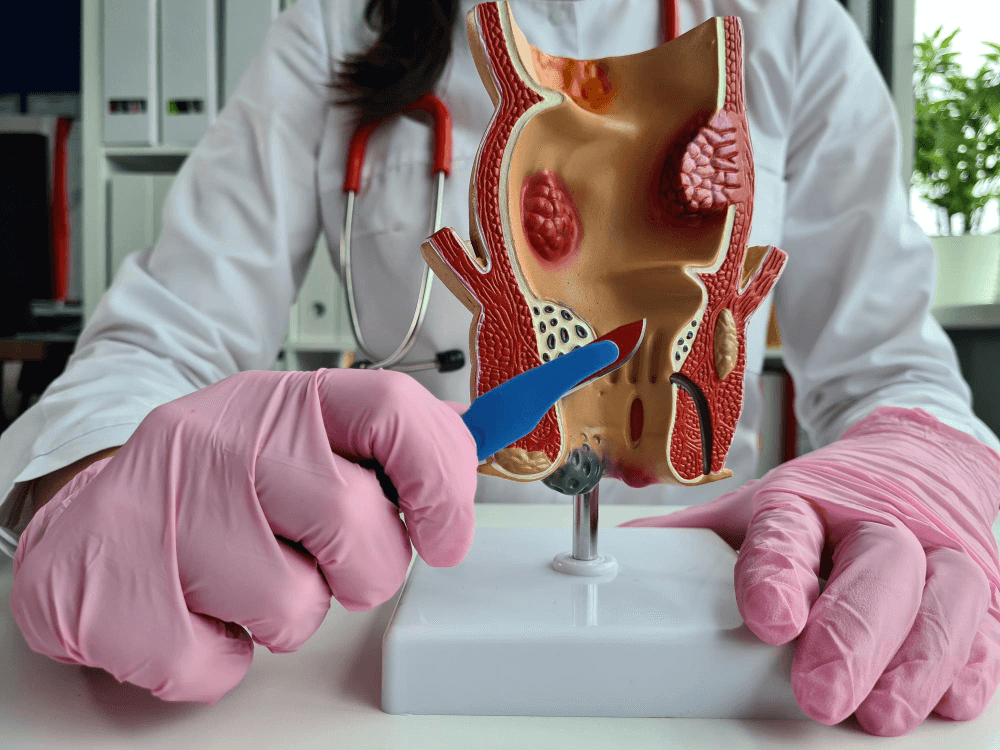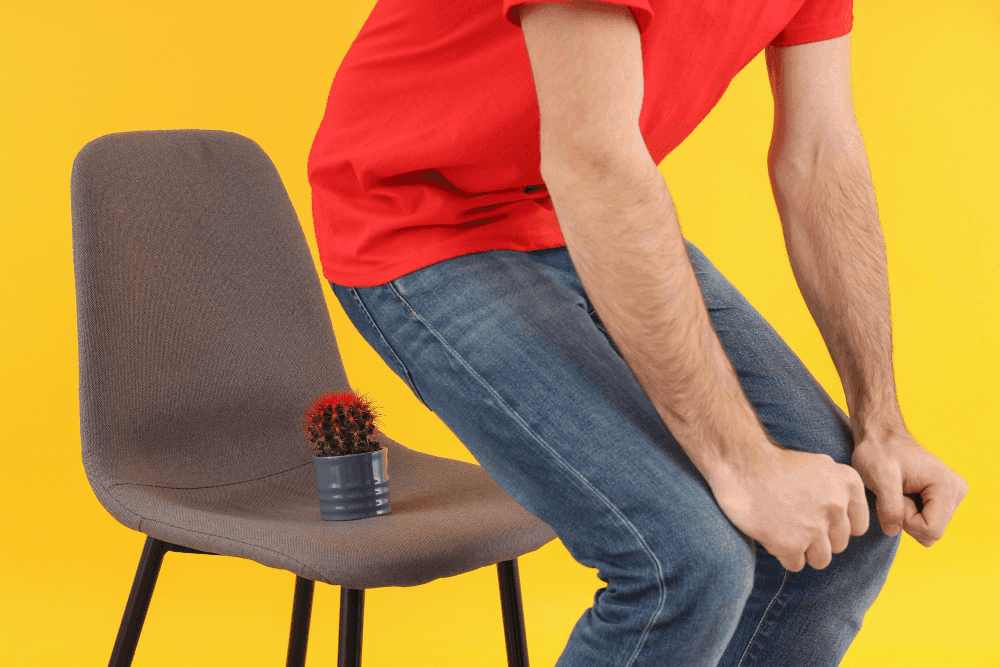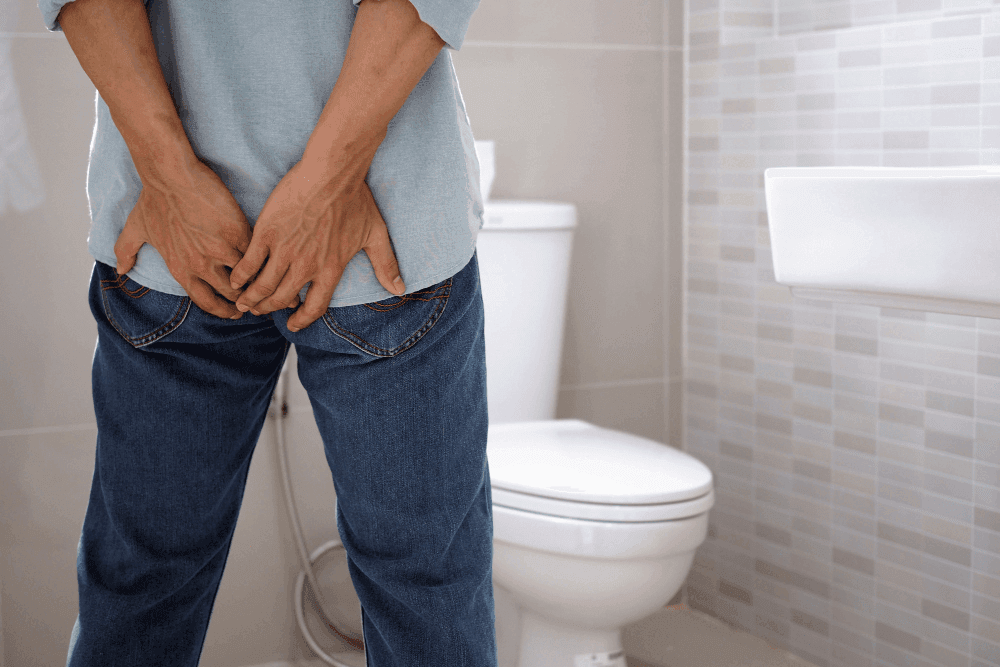Are you experiencing discomfort, swelling, or unusual discharge near your anus? It’s possible you could have an anal fistula. While this condition can be a bit embarrassing to talk about, it’s important to understand the anal fistula symptoms so you can seek the right help.
Anal fistulas often develop from an infection in the anal glands. When the infection spreads, it can create an abnormal tunnel between the anal canal and the skin near the anus. Other anal fistula causes include Crohn’s disease, digestive disorders, and childbirth.
Recognizing these early signs can be crucial for seeking timely medical advice and potentially opting for surgical treatment. So, let’s understand more about the symptoms and what you can do to manage them.
Anal Fistula Symptoms: Know It Quick!
- Pain and swelling are common anal fistula symptoms, especially during bowel movements. You may feel a throbbing or burning sensation near your anus.
- Discharge and drainage from the fistula opening are hallmark signs. You may notice blood or pus that can stain your underwear.
- Skin irritation, redness, and itching around the anus are often present. The constant drainage can cause discomfort and skin problems.
- Risk factors include Crohn’s disease, other digestive disorders, constipation, and childbirth. These conditions can increase inflammation and lead to fistulas.
- In severe cases, fecal incontinence can occur if the fistula damages the anal sphincter muscles. This can cause leakage of stool or gas.

What Is An Anal Fistula?
An anal fistula is a small, uncomfortable tunnel connecting your anal canal (the end of your digestive tract) to the skin near your anus. It typically forms after an abscess (a swollen, pus-filled cavity) near your anus drains out.
The abscess usually gets infected due to blocked anal glands, and while the abscess itself might heal, sometimes the tunnel remains. This tunnel is called the anal fistula.
We see anal fistulas in about 1.69 in 10,000 people per year. You’re at higher risk if you have Crohn’s disease, as up to 50% of people with Crohn’s develop a fistula.
What Are The Common Anal Fistula Symptoms?
Common anal fistula symptoms can be uncomfortable and concerning. You may notice changes in the skin around the anus, as well as pain or drainage. Here are the most concerning symptoms:
- Pain And SwellingThe area around your anus may become red, painful, and inflamed. This is often the first symptom.
- Painful Bowel MovementsYou may feel sharp pain when passing stool, due to the fistula tunnel opening.
- Discharge And DrainageYou may notice blood or pus draining from an opening near the anus. The drainage may be constant or come and go.
- Itching And IrritationThe sphincter muscle may spasm, causing a feeling of fullness, discomfort, and an urge to have a bowel movement.
- Fever (Less Common)If the anal fistula becomes infected, you may develop a fever along with increased pain and swelling.
Besides these common ones, less common symptoms include nausea, chills, and a general feeling of being unwell. In some rare cases, fistulas cause few or no symptoms at all.
Important Note: For visual details, you can see examples of what fistulas actually look like in our anal fistula picture gallery.
Is Skin Irritation A Symptom Of Anal Fistula?
Skin irritation near the anus is one of the most common symptoms of anal fistula.
The constant drainage from the fistula, whether it’s pus, blood, or other fluids, can irritate the delicate skin near your anus. This can cause itching, burning, redness, and overall discomfort.
The irritation might be particularly noticeable if the fistula forms due to an infected anal gland. In these cases, the infection can spread to the surrounding skin, adding to the problem.

Prominent Signs of Anal Fistula: Common Risk Factors
Understanding the common risk factors can help you catch the early signs of anal fistula and seek timely medical advice. Here are the most common risk factors that put you at a higher risk:
- History Of Anal AbscessesIf you’ve experienced an anal abscess before, you’re more likely to develop a fistula. Abscesses often leave behind the tunnels that turn into fistulas.
- Crohn’s DiseaseUp to 50% of people with Crohn’s disease develop a fistula at some point. Crohn’s causes chronic inflammation in the digestive tract, which can lead to fistulas.
- Inflammatory Bowel Diseases (IBD)Conditions like ulcerative colitis, diverticulitis, and perianal abscesses can increase the risk of fistulas by causing inflammation and infection.
- Constipation And Hard StoolsStraining during bowel movements and passing hard stools can damage the anal tissue, increasing the chances of a fistula forming.
- ChildbirthWomen who have had a difficult childbirth, especially with forceps or an episiotomy, are at higher risk of anal fistulas.
- Other Medical ConditionsSome diseases like HIV, tuberculosis, and cancer can weaken the immune system or lead to complications that increase your risk.
There are other less common risk factors as well, such as certain genetically inherited conditions, diabetes, and radiation therapy for cancer.
If you fall into any of these risk categories, regular check-ups can be crucial for early diagnosis and effective management.
Anal Fistula Bleeding: Should You Be Worried About This Rectal Issue?
Anal fistula bleeding and drainage are common symptoms that can be alarming. You may notice blood or pus draining from the fistula opening, which can stain your underwear or cause itching and irritation.
The drainage may have an unpleasant odor. It’s a signal that the fistula is active and possibly infected. Bleeding is usually not severe, but constant drainage can be uncomfortable and lead to skin problems.
In most cases, anal fistula surgery is the best option to stop the bleeding and infection effectively.
Bleeding Or Discharge From The Fistula
If you have an anal fistula, you may notice bleeding or discharge from the opening near your anus. This can start suddenly if an anal abscess bursts, or it may be a chronic issue.
The drainage may be bloody, or it might be a whitish or yellowish pus. You may feel like you constantly need to clean the area. The fistula opening may drain more after a bowel movement.
If you notice an increase in discharge or discomfort, it’s crucial to seek medical advice promptly to manage the condition.
Bleeding Or Discharge Per Anus
Bleeding or discharge per anus is another common symptom that raises concern. While this could be caused by hemorrhoids (piles) or an anal fissure, it’s also a key sign of an anal fistula.
The discharge may contain pus from the infected fistula tract, and sometimes blood is mixed in as well. It’s crucial to see a doctor to determine the source of the issue.
Differentiating between an anal fissure vs fistula is important for getting the right treatment.

Anal Fistula Pain: Type Of Anal Pain In Fistula-In-Ano
Pain is one of the most common anal fistula symptoms. However, the type and severity of anal fistula pain can vary depending on the location and stage of the fistula.
- Persistent PainA dull, aching pain around the anus or rectum is common, even when you’re at rest. This discomfort gets worse when you sit, stand for long periods, or during bowel movements.
- Sharp And Throbbing PainThis intense pain often suggests an active infection or a newly formed abscess. It can make everyday activities difficult.
- Temporary ReliefSometimes, when the fistula drains pus or fluid, the pain might temporarily lessen. However, this doesn’t mean the fistula is gone.
Remember, the intensity of pain can differ from person to person. Even smaller fistulas can cause significant discomfort. If you’re experiencing any of these painful conditions, you must immediately consult a proctologist.
Final Note From Dr. Rajarshi Mitra
While an anal fistula can be a frustrating and uncomfortable condition, remember that medical help is readily available. There are several effective anal fistula treatment options, and a surgeon will recommend the best approach based on your specific case. A thorough physical exam and discussion of your symptoms will help them determine the right course of action.
Early detection is key in the management of any anorectal disorder. By identifying anal fistula symptoms early, you can seek appropriate medical help. Remember, understanding your body is the first step towards maintaining your health and well-being.
Ask Dr. Rajarshi Mitra
What should I expect if I have an anal fistula?
If you have an anal fistula, you may experience pain, swelling, and drainage from the fistula tract. Your doctor will perform a physical exam and may recommend imaging tests to assess the fistula’s location and severity. Treatment often involves antibiotics and fistula surgery to close or remove the abnormal tunnel.
Can an anal fistula be prevented or avoided?
While anal fistulas can’t always be prevented, you can reduce your risk by managing underlying conditions like inflammatory bowel disease, practicing good hygiene, and avoiding constipation. If you notice any symptoms, see a doctor promptly for evaluation and treatment to prevent the fistula from progressing or becoming infected.



















